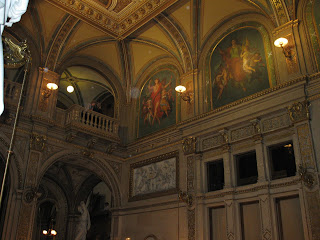 On Thursday the French Fulbright Alumni group put together a Thanksgiving dinner for any alumni, students, exchange teachers, distinguished chairs, and UNESCO Fulbright interns that wanted to come (I've learned that "Fulbright" actually encompasses a wide variety of exchanges). At my families' houses Thanksgiving is always a rather relaxed affair, but it would figure that the French would have to take our casual American holiday and make it a spectacular gastronomic affair.
On Thursday the French Fulbright Alumni group put together a Thanksgiving dinner for any alumni, students, exchange teachers, distinguished chairs, and UNESCO Fulbright interns that wanted to come (I've learned that "Fulbright" actually encompasses a wide variety of exchanges). At my families' houses Thanksgiving is always a rather relaxed affair, but it would figure that the French would have to take our casual American holiday and make it a spectacular gastronomic affair.The dinner was held in a restaurant at Les Frigos, a 6-story meat cellar turned artist work space. The structure is a plain white factory-looking building built during one of the World Wars to house the tons and tons of cows that had been slaughtered as the Germans advanced. The picture to the right shows the menacing pipes that pervade the building.
 In the 60s, I think, the French government decided to give the building to artists, who quickly began to decorate the building inside and out.
In the 60s, I think, the French government decided to give the building to artists, who quickly began to decorate the building inside and out.

Not only was the meal in an incredible place, but the mostly French contributers to the meal made sure to add a sophisticated, gourmet twist to their dishes. The turkey was cooked like a steak, and it was served covered with a sauce. The mashed potatoes were sweet potatoes with just the right spices. Of course there was lots of wine and Perrier to drink. The tables were adorned with festive, fall centerpieces.
I was oddly the only Fulbrighter of my kind (U.S. Student is my title), and one of just a handful of Americans at all. This disappointed me because I haven't seen the other American students since late October, but it also gave me an opportunity to practice my French, because the crowd was mostly French alumnae of the program who had once been on a Fulbright to the U.S. I talked with a couple passionate about music and art in general for an hour, and they eventually gave me their contact information and suggested that we visit the various composers' museums in the Paris area in the Spring, once the leaves come out on the trees. I had read before coming here that the French like to engage in lively conversation, and that interruptions are actually encouraged because this shows enthusiasm. I was very proud of myself for being able to do this, and therefore take part in the discussion in an appropriate way.
One other great part of the night was that one of the alumni there was a sculpter that had a studio at Les Frigos. In groups of 20 at a time he gave us a tour of his studio, where several of his original pieces were on display.

 At first they seemed bizarre, but the artist explained that he was interested in geology and archeology, and that he focused on the layers of the Earth's surface, because we humans are intimately connected to it. The sculptures in the pictures are made of pieces of iron that are either oxidized or burned to create color, and the artist welds small pieces of something, I think more metal, carefully on the surface to create the appearance of soil. A single tree typically adorns it. I loved the sculpture in the picture on the left because it's all gray.
At first they seemed bizarre, but the artist explained that he was interested in geology and archeology, and that he focused on the layers of the Earth's surface, because we humans are intimately connected to it. The sculptures in the pictures are made of pieces of iron that are either oxidized or burned to create color, and the artist welds small pieces of something, I think more metal, carefully on the surface to create the appearance of soil. A single tree typically adorns it. I loved the sculpture in the picture on the left because it's all gray.What a unique experience! But still, it felt strange to not be in the U.S. during Thanksgiving. Besides family, the thing I missed the most was all of the football.










